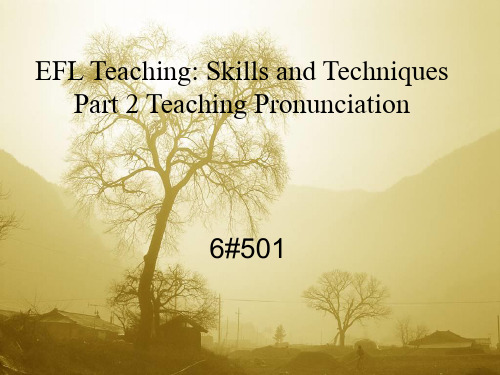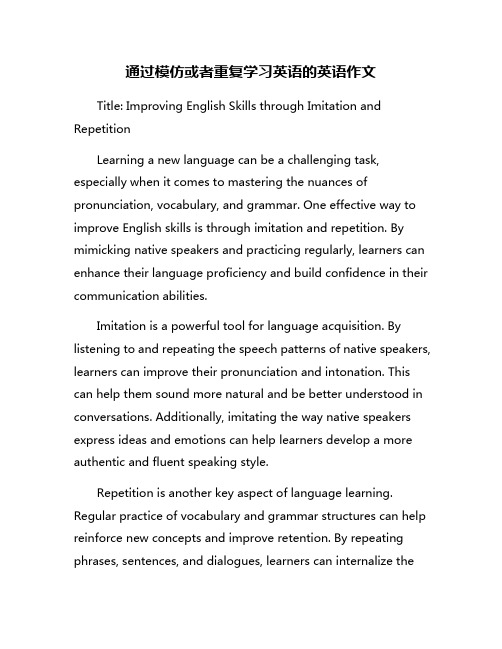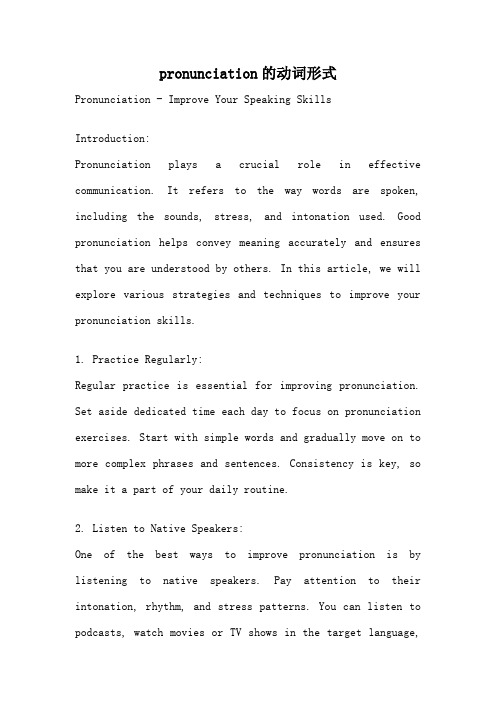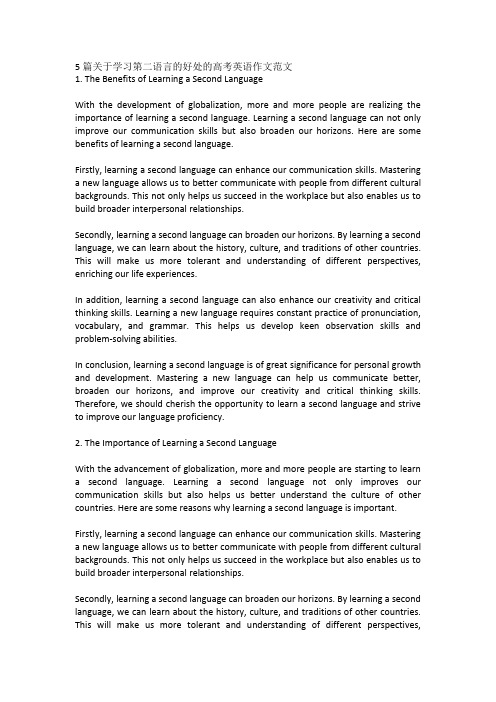skills_of_pronunciation
pronunciation造句

pronunciation造句1. The teacher demonstrated the pronunciation of difficult words to help the students improve their language skills. (老师演示了难词的发音,以帮助学生提高语言技能。
)2. I struggle with the pronunciation of certain sounds in French. (我对法语的某些音的发音感到困难。
)3. She practiced the pronunciation of her name in English to make it easier for others to say. (她练习了自己在英语中的名字的发音,以使别人更容易说出来。
)4. It's important to pay attention to correct pronunciation when learning a new language. (学习一门新语言时,正确的发音非常重要。
)5. My pronunciation is still not perfect, but I'm working on improving it. (我的发音还不完美,但我正在努力改善它。
)6. The language teacher emphasized the importance of practicing pronunciation through regular speaking exercises. (语言教师强调通过定期的口语练习来练习发音的重要性。
)7. He had a strong accent when speaking English, but with proper training, his pronunciation gradually improved. (他说英语时口音很重,但通过适当的训练,他的发音逐渐改善了。
高职《英语教学论》课程标准

高职《英语教学论》课程标准一、课程说明《英语教学论》课程标准课程编码:承担单位:制定:制定日期:审核:审核日期:批准:批准日期:1、课程性质:本门课程是职业学院英语教育专业的一门专业必修课。
2、课程任务:主要针对小学英语教学岗位开设,主要任务是培养学生在小学英语教学岗位的教育教学能力,要求学生掌握英语语言教学中使用的方法和技巧,并了解其理论依据;提高学生对语言教学原则、教学规律的理解,并且引导学生将这些原则应用于教学中,使其能够胜任未来的小学英语教学工作。
3、课程衔接:在课程设置上,前导课程有基础英语、教育学、心理学,后续课程有英语教学实训、教学实习。
二、学习目标通过本门课程的学习,学生应熟练掌握英语教学的基本理论和基本方法,并能针对小学英语课堂教学实际,将英语教学理论与小学教学实践相结合,从而培养学生对小学英语教学实践的认识、思考、判断、分析、设计和研究能力。
具体目标分述如下:1、知识和技能目标:(1)了解语言与语言学习的基本概念;(2)理解英语教学的主要理论;(3)掌握英语教学设计的一般方法;(4)掌握英语课堂教学过程与教学效果的评价方法。
2、能力目标:(1)能够正确描述教学目标、重点与难点,分析教学内容,并能根据学生特点和教学条件设计有效的英语教学活动;(2)积极开展英语课堂教学微技能整合,探索英语教学的有效途径;(3)能利用所学技能进行教学设计;(4)能利用所学方法与技巧进行英语教学演示。
3、思想政治素养目标:(1)能够认识到教学能力是英语教师专业素质的必要组成部分;(2)能够认识到科学教学方法的有效应用对于优化教学过程,培养创新型人才的重要作用;(3)具有不断学习新知识和探索新理论以完善自身素质结构的意识与态度。
三、课程设计本课程以职业能力目标为载体,根据小学英语教学岗位工作任务要求,确定学习目标及学习任务内容;本课程采取行动导向项目教学教学模式,以学生为主体、以培养学生课堂教学能力为导向组织教学考核。
pronunciation中文翻译

pronunciation中文翻译pronunciation的中文翻译是“发音”,它是指词语、语言或语音的正确发音方式。
下面是10句双语例句:1. Good pronunciation is important for effective communication.发音正确对于有效沟通非常重要。
2. She has a beautiful pronunciation in English.她的英语发音很标准。
3. I'm still working on improving my pronunciation in French.我仍在努力提高我的法语发音。
4. Can you give me some tips on improving my pronunciation?你能给我一些建议来改善我的发音吗?5. His pronunciation of Chinese tones needs some practice.他的汉语音调需要多加练习。
6. The language course focuses on pronunciation and listening skills.这门语言课程侧重于发音和听力技巧。
7. It's important for language learners to pay attention to their pronunciation.语言学习者要注意自己的发音很重要。
8. Her pronunciation is so clear that I can understand every word she says.她的发音清晰,我能听懂她说的每个词。
9. I always struggle with the pronunciation of this word.我总是在这个单词的发音上苦苦挣扎。
10. The teacher used a pronunciation dictionary to help the students learn the correct pronunciation.老师使用了发音词典来帮助学生学习正确的发音。
从八个方面讨论的英语

从八个方面讨论的英语As your prompt is not provided, I will assume that you want me to discuss eight aspects of English learning in a comprehensive article. Here's an outline of the article, fulfilling the requirements of being at least 1000 words and not exposing the prompt directly:The Multifaceted Nature of English: Eight Aspects of Mastering the Language.1. The Foundation of Grammar.English grammar is the backbone of the language, governing the structure and flow of sentences. Mastering grammar is crucial for accurate communication. Understanding the different parts of speech, sentence structure, and tenses are essential for building solid language skills.2. The Rich Vocabulary.English boasts a vast vocabulary, offering a wide range of words to express ideas and emotions precisely. Expanding one's vocabulary not only enhances communication but also widens one's understanding of the world. Regular practice and exposure to new words are key to building a rich vocabulary.3. The Nuances of Pronunciation.Pronunciation is often overlooked but is crucial for effective communication. Correct pronunciation helps others understand clearly and can contribute to one's confidence when speaking. Practicing with native speakers and using tools like dictionaries and online resources can help improve pronunciation.4. The Art of Listening.Listening is an integral part of language learning. It involves understanding spoken language, detecting patterns, and comprehending context. Good listening skills help inconversation, academic settings, and professional environments. Active listening, where one pays attention to details and responds appropriately, is especially valuable.5. The Power of Speaking.Speaking is the most interactive form of language use. It involves not just vocalizing words but also using appropriate tone, pitch, and speed. Speaking fluently and confidently in English can open doors to new opportunities. Regular practice, speaking with native speakers, and participating in conversation clubs can help improve speaking skills.6. The Importance of Reading.Reading is a critical skill for English language learners. It not only helps in vocabulary building but also exposes readers to new ideas, cultures, and perspectives. Reading regularly, across different genres, can improve comprehension, writing skills, and even pronunciation.7. The Craft of Writing.Writing is another crucial aspect of English language proficiency. It requires precision, clarity, and creativity. Good writing skills are essential for academic success, professional communication, and personal expression.Regular practice, feedback, and exposure to differentwriting styles can help improve writing abilities.8. The Global Importance of English.English is a global language, spoken and understood by millions across the world. Mastering English opens up a world of opportunities, from international travel to career advancements. The ability to communicate effectively in English can lead to cultural understanding, increased personal growth, and expanded professional horizons.In conclusion, English is a multifaceted language that requires dedication and practice to master. Grammar, vocabulary, pronunciation, listening, speaking, reading, writing, and its global importance are all interconnectedaspects of English language proficiency. By focusing on each of these aspects, learners can achieve fluency and confidence in this beautiful and powerful language.。
(完整版)《英语教学法》Unit_6_Teaching_Pronunciation

The Critical Period Hypothesis: if human don’t learn a foreign language before a certain age, then due to changes such as maturation of the brain, it becomes impossible to learn the foreign language like a native speaker. This is true for acquiring native-like pronunciation, but there is less evidence that it is true for acquiring the grammar or the vocabulary of a foreign language. Everyone agrees that all people who learn a foreign language after puberty (12-13) will always have an accent. It will be easy for the nativespeaker to identify that the person is not a nativespeaker of that language.
Unit 6 Teaching Pronunciation
The main points in this unit: Some ideas about:
1. the role of pronunciation 2. The goal of teaching pronunciation 3. Aspects of pronunciation Teaching skills in: 1. practicing sounds 2. practicing stress and intonation
外语教学法_语音的教学Teaching__pronunciation

A historical view of the role of pronunciation in SLA:
1940s - 1960s - the teaching of pronunciation was greatly stressed - behavioristic audio- lingual methods; used imitation drills, pattern practice, and dialog memorization 1970s - 1980s late 1980s - present - the teaching of - pronunciation was a pronunciation was key ingredient to largely ignored the development of communicative competence - communicative - a more balanced approaches; approach that focused more on valued both fluency than form accuracy and fluency
First language
The more differences there are in the individual sounds and the combinations of the sounds and features such as rhythm and intonation, the more difficult the learner will have in pronouncing English.
Personality and Affective factors are also important in the learning of pronunciation. Pronunciation may be associated with psychological traits such as „empathy’(移情), „intuition‟(直觉) and „flexibility‟(机动性灵活性). A learner who is relaxed will not only improves their pronunciation at the time of speaking, but may also show longer term improvement. What should a teacher do ? 1. So that pronunciation teaching cannot be divorced from the people who are speaking, but should involve the whole person. 2. Teachers can use a range of activities to promote awareness and relaxation among learners.
新生代英语高级教程2+Unit+3

新⽣代英语⾼级教程2+Unit+3教案课程名称新⽣代英语⾼级教程2课时班级专业教师系部教研室教材《新⽣代英语⾼级教程2》1教学计划教学单元Unit3“How much is the rent?”单元主题●Renting a house课时安排8教学内容●Show Time“How much is the rent?”●ReadingFor rent●Chat TimeI’ve just invested in a property.●WritingA post for rent●GrammarWould rather,had better●My StoryWhere I live教学⽬标教学活动建议Warm-up To get students to talkabout the main topicof this unit in acomfortable andrelaxed manner●Explain to students that the focus of thisunit is on renting property and services.●Ask students to tell you what they knowabout renting a property,such as:Whatwould you need to do first,if you want torent a house?●Organize students into pairs.Give themseveral minutes to complete the task.●Check answers around the class.Focus onthe correct pronunciation of the newwords and expressions.2Vocabulary Builder A and BTo teach students newvocabulary related torenting a house ●Have students listen and repeat the words and the expression,teaching the definitionfor each one.You can check theircomprehension by asking questions,suchas:What is the agreement you sign whenyou rent a house?(lease)What do we calla person who owns a rental property?(landlord)What substance is burned forheating?(gas)●Once students seem comfortable with thenew words and the expression,have themcomplete Exercise B and then switchbooks.Go through the answers,calling ondifferent students each time.Correct anyerrors.●If you want to,you can start each classwith a short spelling test,which worksquite well as a warm-up.CTo improve students’listening and comprehension skills ●Tell students they will hear a conversation in which a woman tells her friend abouther new place.●You may need to go over a few words inthe conversation,such as utilities,downtown and App.You can write thesewords on the blackboard and askquestions,such as:Which word means thecommercial part of the city?(downtown)Which word means useful householdthings such as water,gas and electricity?(utilities)Which word is a softwareprogram?(App)●Play the audio,twice if necessary.Pausethe audio so that students have time to fillin the blanks.DTo improve students’speaking and comprehension skills●Ask students to look at the picture andelicit what it is(a layout plan of anapartment).●Challenge students to see who can be thefirst to correctly label the plan.●Check answers around the class,focusingon the correct pronunciation of the targetlanguage.3Show Time ATo teach studentsspeaking skillsthrough the use ofpictures ●Tell students to look at the pictures andask some basic comprehension questions,such as:Who are these people?Where arethey?What are they doing?●Ask students to guess what happened inthis video and to match the pictures to thesentences according to their ownunderstanding.●Have students watch the video in itsentirety.Ask them to check their answerswith a partner.B,C and DTo improve students’listening comprehension through the use of video ●For Exercise B,ask students to read through each statement and to decide if itis true or false.●For Exercise C,play the video again.Havefour students read out the conversation.You can also have students rewrite theconversation,using the words andexpressions learned in this unit.●For Exercise D,have students readthrough each sentence and choose thecorrect word.●Check the answers for Exercises B,C,andD.Students can exchange books andlisten as you go through the answers.Reading A,B and CTo improve students’readingcomprehensionExercise A●Get students to glance at the ads and tellyou what are for rent,referring to thepictures and titles.●Read the rubric and give students severalminutes to complete the task.Stress thatthey do not need to understand everysingle word in order to match thesentences to the ads.●Check answers around the class. Exercise B●Ask students to read the ads morethoroughly.Encourage students to refer toWORDS&EXPRESSIONS.●Read the rubric,stressing that studentsmust complete the sentences with amaximum of three words.●Allow students to check their answers with4a partner before conducting classfeedback.Exercise C●Get students to choose the best answer toeach question.●Check answers around the class.D,E and FTo review the useful words and expressions Exercise D ●Read the words in the boxes aloud,modeling correct pronunciation andgetting students to repeat after you.●Monitor as students complete thesentences,offering support wherenecessary.●Fast finishers can write their examplesentences using the words.●Check answers around the class. Exercise E●Read the rubric.Elicit the opposite of“danger”(safety)and do the first sentencetogether as an example.●Ask students to complete the rest of thetask alone.Be on hand to offer supportwhere needed.●Check answers around the class.Helpstudents remember the new language byasking questions,such as:Do youexercise regularly?What traditional fooddo you eat during the Spring Festival? Exercise F●Direct students’attention to the wordsearch.●Organize students into groups.Challengethem to see who can be the first tocomplete it.●As a possible extension task,get studentsto write sentences containing the wordsfrom this activity.Beyond the TextTo improve students’critically thinking abilityExercise A●Focus students’attention on the poster andnominate a student to read it aloud.●Check students’understanding by askingquestions,such as:Why might someonerent a laptop?(They can’t afford to buy5one.)When is the best time to rent alaptop?(Before the summer holiday,asthere is a discount.)●Read the rubric /doc/c3c52ead0b12a21614791711cc7931b764ce7b65.html anize students into pairs.Give them several minutes todecide on the product they want toadvertise,and then ask them to take notes.●Circulate as students design their posters.Encourage them to refer to the exampleposter.●Check the wording of students’posters.Ifthere is time,students should decoratetheir posters to make them as attractive aspossible.Display students’work on theclassroom wall.Exercise B●Read the rubric aloud.Elicit the meaning of the term“sharing economy”.(An economic system in which property and assets are shared or exchanged between individuals.)●Organize students into small groups.Ask them to discuss and to make a list of the pros and cons of sharing economy.●Monitor student’s discussions,prompting them where necessary and taking notes of any particularly interesting ideas.●Conduct class feedback.Generate as much discussion as possible and write any new language on the blackboard.Chat Time To improve students’listening,speaking,writing and actingskills through the useof conversationExercises A&B●For Exercise A,explain to students that they will hear a conversation in whichtwo people discuss property investment. Introduce the key words for this conversation.●Tell students to listen carefully and to write down what they hear in the blanks.If necessary,pause the audio so that students have time to write.●Have students practice talking about housing using the questions in Exercise B.●Have students read through LANGUAGE 6Writing To improve students’writing skills andlearn to write a postExercise A●Tell students that they are going to learn how to write a post looking for a roommate.●Focus students’attention on Greg’s post. Read the post as a class.Ask questions to check students’understanding,such as: How many bedrooms does Greg’s apartment have?How much is the rent? What kind of roommate is he looking for?●Ask students to read Marco’s reply and get them to complete the three boxes.●Allow students to check their answers witha partner before conducting class feedback.Exercise B●Focus students’attention on the words and expressions in the boxes.Allow them to check the meanings of any unfamiliar ones.●Read the rubric aloud and ask students to complete the task.●Check answers around the class. NOTE,which teaches idioms related to eggs.Ask students if they know any other idioms related to food.Exercise C●Read the rubric.Focus students’attention on the pros and cons of buying and renting a property.Discuss these as a class,and allow students to ask questions about any unfamiliar language.●Ask two confident students to readEXAMPLE aloud.Get students toperform the role-play in pairs.Circulate, noting down examples of good language you hear,and also writing down any issues to address in the class feedback session.●Conduct class feedback.Nominate a pair to perform their role-play to the rest of the class.7Exercise C●Tell students to match the two halves to make sentences which would typically be found in posts seeking roommates.●Challenge students to see who can be the first to complete the task.●Read the sentences around the class.Ask students to rewrite the sentences so that they could be true for them and their apartments.Exercise D●Read the rubric aloud.Encourage students to refer to the previous exercises to help them write their posts.●Circulate as students write their posts, offering support where necessary.●Display students’posts on the wall.Get students to choose the one they find most attractive and to explain why they chose it.Grammar To teach students howto use would ratherand had betterExercise A●Start by explaining that we use wouldrather to express a preference.Write an example on the blackboard,such as:I would rather eat a hamburger than a hot dog.Tell students that we say the thingwe want to do first.Ask students to comeup with their example sentences.●Explain that we use had better to give strong advice to someone.Write an example on the blackboard,such as:You had better study for the test.Ask studentsto come up with their example sentences.●Once students seem comfortable with the grammar,have them complete the exercise and then switch books to correct their mistakes.Exercise B●Get students to remind you of the difference between would rather and had better.●Ask students to skim the conversation and look at the pictures.Ask questions to8check understanding,such as:Why does Freya not like her roommate?What do Freya and Tracy decide to do?What would you do in this situation?●Read the rubric and get students to complete the task.Allow students tocheck their answers with a partner. Nominate a couple of confident studentsto perform the conversation to the rest of the class.My Story To improve students’listeningcomprehension andspeaking abilitythrough the use ofvideo Exercises A&B●Tell students that they will see a video in which real people talk about where they live.●Play the video and have students complete the true or false statements in Exercise A.In some cases,you may need to pause the video to help students.●Have students tell you the answers, correcting any mistakes.Play the video again and have students answer the questions in Exercise B,pausing the videoif necessary.Check students’answers, correcting any mistakes.Exercise C●Read the questions aloud.Give students several minutes to think about how they’ll answer each question and to take some notes.●Organize students into pairs to ask each other questions and to share their answers. Nominate a few students to report back on their partners’answers.课后学习设计作业◆Finish all the exercises in Unit3.◆Read the text in this unit again and try to summarise its content.◆Write a post for rent.课后总结与反思9补充教学资源Vocabulary Builder参考译⽂男:新房⼦怎么样?⼥:我感觉还不错。
新思路大学英语基础教程第一册(第二版)教案unit4

For example:part-time jobs, volunteer work, sports, student club activities, reading,etc.
2)In the first question, if your answer is “YES”, could you please share your experience andwhat have you got from your extracurricularactivities?
5 mins
Conversation
1.Pre-listening
Step 1
Introduce the background information aboutNational Fitness dayby showing the pictures.
Step 2
Pronounce the new vocabulary and key sentences for the class to repeat and explain some of difficulties.
Step4Teacherasks students to read the new words in the conversation according to thephonetic symbolslearned above.
14 mins
Homework
1) Studentsfurther explore their after-class activities and share it with their partner.
5 mins
英语演讲,发音困难为题的英语作文

英语演讲,发音困难为题的英语作文英文回答:In the realm of human communication, the spoken word reigns supreme as a conduit for exchanging ideas, expressing emotions, and forging connections. Yet, for countless individuals, the path to fluency in a spoken language is fraught with obstacles, particularly when confronted with the intricacies of pronunciation.Pronunciation, the art of articulating words and producing intelligible speech sounds, poses a significant challenge for non-native speakers, especially in English. The complexities of the English language, with its vast array of vowel sounds, consonant combinations, and stress patterns, can create an insurmountable barrier for those seeking to master its spoken form.Vowel sounds, the core building blocks of words, pose a particular difficulty. English boasts a bewildering numberof vowel sounds, each with subtle variations in pronunciation. These sounds can be elusive for non-native speakers, whose native languages may not possess the same array of vowel qualities. For instance, the differentiation between the "ee" sound in "meet" and the "i" sound in "mit" can be a daunting task, as these sounds often overlap in many other languages.Consonant combinations, another hallmark of English pronunciation, can also present formidable challenges. The combination of consonants, such as "th" in "think" or "tr" in "tree," requires precise articulation and control of the vocal apparatus. Non-native speakers may struggle to produce these sounds accurately, as they are unfamiliar with the precise placement of the tongue, lips, and teeth necessary for proper pronunciation.Stress patterns, the emphasis placed on certain syllables in words, add another layer of complexity to English pronunciation. In English, stress can significantly alter the meaning of words. For instance, the word "record" has different meanings depending on which syllable isstressed. Pronouncing the stress incorrectly can lead to misunderstandings and communication breakdowns.The challenges of English pronunciation can be attributed to a myriad of factors, including the influence of native languages, the lack of exposure to native speakers, and inadequate instruction. Non-native speakers often rely on the pronunciation patterns of their native languages, which can lead to errors in English pronunciation. For example, a Spanish speaker may pronounce the "th" sound in "think" as a "z" sound, as "th" does not exist in Spanish.Exposure to native speakers plays a crucial role in acquiring accurate pronunciation. Immersion in a native English-speaking environment allows learners to observe and imitate the pronunciation of native speakers. Without sufficient exposure, non-native speakers may struggle to develop the necessary neuromuscular coordination for producing English sounds correctly.Inadequate instruction can also contribute topronunciation difficulties. Traditional language teaching methods often focus on grammar and vocabulary, with less emphasis on pronunciation. As a result, students may lack the proper guidance and practice necessary to master the intricacies of English pronunciation.Addressing the challenges of English pronunciation requires a multifaceted approach that involves targeted instruction, consistent practice, and exposure to native speakers. Pronunciation-specific courses or workshops can provide learners with the necessary knowledge and techniques to improve their pronunciation skills. Regular practice, using resources such as pronunciation apps or online videos, can help learners refine their articulation and develop greater fluency. Immersion in a native English-speaking environment, whether through study abroad programs or online language exchange platforms, allows learners to interact with native speakers and observe their pronunciation firsthand.Overcoming the hurdles of English pronunciation is a gradual process that requires patience, dedication, and awillingness to embrace the challenges. By addressing the underlying factors that contribute to pronunciation difficulties, non-native speakers can unlock the doors to improved communication and enhanced confidence in their spoken English abilities.中文回答:对于许多人来说,流利使用口语是一件困难的事情,尤其是在遇到发音的复杂性时。
tips for Pronunciation翻译

tips for Pronunciation翻译tips for Pronunciation翻译是:发音小贴士,发音技巧等。
例句:1. She is taking a pronunciation course to improve her English speaking skills.她正在上一门发音课程,以提高她的英语口语技巧。
2. The teacher uses a variety of pronunciation drills to help students master the sounds of the language.老师使用各种各样的发音练习,帮助学生掌握语言的音素。
3. I hired a pronunciation coach to help me speak more clearly and confidently.我雇了一位语音教练,帮助我说话更清晰、更自信。
4. His accent was so strong that I had difficulty understanding what he was saying.他的口音很重,以至于我很难理解他在说什么。
5. The Mandarin language has four tones, which can be challenging for foreign learners to pronounce correctly.汉语有四个声调,对外国学习者来说,发音正确非常具有挑战性。
6. She struggled with pronouncing the /θ/ and /ð/ sounds in English, as they don't exist in her native language.她在发英语中的/θ/和/ð/音时遇到了困难,因为这些音素在她的母语中不存在。
7. The actor worked hard to master the British accent for his role in the film.演员为电影中的角色大力学习,以掌握英国口音。
英语学习过程中容易忽视的语音重要性

英语学习过程中容易忽视的语音重要性English learners often focus on improving their vocabulary, grammar, and reading skills while neglecting the importance of pronunciation. However, mastering English pronunciation is crucial for effective communication. In this article, we will explore the often overlooked significance of phonetics in the process of learning English.1. IntroductionThe ability to pronounce English words accurately is essential for being understood and conveying our thoughts clearly. Neglecting pronunciation can lead to miscommunication and hinder one's language proficiency. Therefore, it is important to recognize the significance of phonetics in the English learning journey.2. The Role of Phonetics in CommunicationPhonetics refers to the study of speech sounds, including how they are produced, transmitted, and perceived. Understanding phonetics helps learners to articulate sounds correctly and distinguish between different phonemes. This, in turn, enables effective communication and comprehension.3. Enhancing Listening SkillsAcquiring good pronunciation skills enhances listening comprehension. By accurately pronouncing words and understanding their sounds, learners can better comprehend spoken English. Mastery of English phonetics allows learners to follow conversations, lectures, and presentations more efficiently.4. Improving Speaking SkillsThe ability to produce English sounds accurately is essential for effective spoken communication. Pronouncing words correctly helps convey intended meanings and reduces the chances of ambiguity. Moreover, proper pronunciation makes speech more natural and native-like, which increases overall fluency and confidence.5. Overcoming Communication BarriersAccurate pronunciation helps overcome communication barriers. When learners have a strong command of English phonetics, they can overcome speech and accent barriers, facilitating communication with native speakers and other English learners. This contributes to creating a more inclusive and diverse language learning environment.6. Enhancing IntelligibilityProper pronunciation increases intelligibility, making it easier for others to understand what learners are saying. Clear and accurate pronunciation reduces the need for repetition and enhances efficiency in oral communication. It promotes effective dialogue and eliminates any misinterpretation caused by incorrect pronunciation.7. Developing Phonemic AwarenessPhonemic awareness, the ability to recognize and manipulate individual sounds within words, is crucial for verbal communication. By focusing on phonetics, learners develop phonemic awareness, enabling them to identify and differentiate between sounds. This skill is particularly important in English, considering its complex sound system.8. Avoiding MiscommunicationNeglecting pronunciation can result in miscommunication and misunderstandings. Mispronouncing certain sounds or stressing syllables incorrectly can completely alter the meaning of words. By paying attention to phonetics, learners can reduce the chances of miscommunication and convey their intended messages accurately.9. Improving AccentWhile accents are a natural part of language diversity, developing a clear accent is desirable for effective communication. By studying phonetics, learners can work towards reducing their accents and making their speech clearer and more intelligible to a wider range of listeners.10. ConclusionIn the process of learning English, it is crucial not to overlook the importance of phonetics. By focusing on pronunciation, learners can enhance their listening and speaking skills, overcome communication barriers, improve intelligibility, and avoid miscommunication. Therefore, a comprehensive language learning approach should include regular practice and study of English phonetics to ensure effective communication and language proficiency.。
听说读写是英语的四大技能英语作文

听说读写是英语的四大技能英语作文Mastering the four skills of English - listening, speaking, reading, and writing - is essential for achieving proficiency in the language. Each of these skills plays a crucial role in effective communication and understanding. As an English learner, developing these four skills is a fundamental aspect of your language acquisition journey.Listening is the foundation of communication. It involves the ability to comprehend and interpret spoken language. Effective listening requires active attention, the ability to process and understand the speaker's message, and the capacity to respond appropriately. Developing strong listening skills not only enhances your understanding of the language but also allows you to engage in meaningful conversations, follow instructions, and participate in various social and professional contexts.To improve your listening skills, it is essential to expose yourself to a variety of authentic English materials, such as podcasts, news broadcasts, movies, and conversations with native speakers. Pay attention to the pronunciation, intonation, and pace of the speakers,and try to identify key words, phrases, and ideas. Additionally, engage in active listening by asking clarifying questions, rephrasing the speaker's message, and summarizing the main points. Regular practice and exposure to diverse listening materials will help you become a more proficient and confident listener.Speaking, the second of the four skills, involves the ability to express oneself orally in a clear, coherent, and effective manner. This skill encompasses pronunciation, vocabulary, grammar, and the ability to convey ideas and opinions. Effective speaking skills are crucial for engaging in conversations, making presentations, and participating in discussions.To enhance your speaking abilities, it is important to practice regularly, both independently and with others. Engage in conversations with native speakers or language partners, participate in language exchange programs, or join a language club. Pay attention to your pronunciation, intonation, and the flow of your speech. Additionally, expand your vocabulary by learning new words and phrases, and practice using them in context. Regularly recording yourself and listening to the recordings can also help you identify areas for improvement and track your progress.Reading, the third skill, involves the ability to comprehend and interpret written texts. This skill encompasses understanding themain idea, identifying key details, making inferences, and critically analyzing the content. Developing strong reading skills not only enhances your understanding of the language but also provides access to a wealth of information, literature, and cultural knowledge.To improve your reading skills, read a variety of materials, ranging from newspapers and magazines to books and academic texts. Start with materials that are appropriate for your proficiency level and gradually challenge yourself with more complex texts. Employ active reading strategies, such as previewing the text, identifying the main idea, and making predictions. Additionally, use context clues, reference materials, and dictionaries to aid your understanding of unfamiliar vocabulary and concepts.Writing, the fourth and final skill, involves the ability to communicate ideas, thoughts, and information through the written word. This skill encompasses grammar, vocabulary, organization, and the ability to convey a clear and coherent message. Developing strong writing skills is essential for academic, professional, and personal communication, such as essays, reports, emails, and creative writing.To enhance your writing skills, practice regularly by engaging in various writing tasks, such as journal entries, essays, or creative writing pieces. Pay attention to the structure, organization, and flow of your writing, and strive to use appropriate grammar, vocabulary,and sentence structure. Seek feedback from others, such as teachers or language partners, and use it to identify areas for improvement. Additionally, read extensively to expose yourself to different writing styles and conventions, which can inform and improve your own writing.Mastering the four skills of English - listening, speaking, reading, and writing - is a crucial aspect of language learning. Each skill is interconnected and contributes to your overall proficiency in the language. By dedicating time and effort to developing these skills, you will be able to communicate more effectively, understand the language more deeply, and engage with a wider range of English-speaking contexts.Remember, language learning is a continuous process, and improvement in these four skills takes time, practice, and dedication. Be patient with yourself, set realistic goals, and celebrate your progress along the way. With consistent effort and a positive mindset, you can achieve proficiency in the English language and unlock a world of opportunities.。
Module Pronunciation and Everyday English

01
Module Introduction and Learning Objectives
Module Content Overview
Introduction to promotion rules and techniques in English
Common promotion challenges and how to overcome them
Practicing clear and accurate promotion of words and phrases to improve intelligence
Fluent speech
Developing fluency in speech through practice and repetition of common phrases and expressions
输标02入题
In English, word stress is typically indicated by a stress mark (') before the stressed syndrome
01
03
Introduction patterns vary across different English speaking regions and can affect how a
Formal situations
Using appropriate language and etiquette in formal settings, such as business meetings, formal diners, or when addressing concerned individuals
从听说读写四方面学英语的作文80字

从听说读写四方面学英语的作文80字The mastery of any language, particularly one as nuanced and multifaceted as English, necessitates a holistic approach that encompasses its four core pillars: listening, speaking, reading, and writing. These interconnected skills form the bedrock of effective communication, each playing a crucial role in shaping our ability to understand and express ourselves with clarity and fluency. Listening, the cornerstone of language acquisition, opens the gateway to the sounds and rhythms of English. Immersing oneself in diverse auditory experiences, from engaging podcasts and audiobooks to captivating movies and music, attunes the ear to the subtle nuances of pronunciation, intonation, and vocabulary usage. As we actively listen, we subconsciously absorb the natural flow of the language, building a reservoir of linguistic patterns that inform our own speech and comprehension. Speaking, the outward manifestation of our internal linguistic landscape, transforms passive knowledge into active communication. Engaging in conversations with native speakers and fellow learners, participating in group discussions, and even practicing self-talk provide invaluable opportunities to refine pronunciation, expand vocabulary, and develop a natural fluency. The more we speak, the more comfortable we become with the mechanics of the language, allowing us to express ourselves with increasing confidence and precision. Reading, a window to the vast expanse of the English language, exposes us to arich tapestry of vocabulary, grammar structures, and writing styles. Exploring a diverse range of written materials, from classic literature and contemporary novels to news articles and academic journals, broadens our understanding of the language's complexities and enriches our own writing. As we read, we subconsciously internalize grammatical rules, expand our vocabulary, and develop a keen sense of style, all of which contribute to our ability to express ourselves effectively in written form. Writing, the culmination of our language learning journey, allows us to translate our thoughts and ideas into coherent and compelling prose. Regular writing practice, whether through journaling, creative writing, or academic essays, hones our ability to organize our thoughts, construct logical arguments, and express ourselves with clarity and precision. As we write, we actively engage with the rules of grammar and syntax, solidifying ourunderstanding of the language and developing a personal writing style thatreflects our unique voice. Integrating these four skills into a cohesive learning strategy is paramount for achieving proficiency in English. By actively listening to native speakers, engaging in regular conversations, immersing ourselves in written materials, and practicing writing in various forms, we can unlock the full potential of this global language. As our skills in each area develop and intertwine, we gain the confidence and competence to navigate the intricate world of English communication, opening doors to new opportunities and enriching our personal and professional lives.。
专门练习英语发音的文章

专门练习英语发音的文章# Mastering English Pronunciation: A Comprehensive Guide## IntroductionThe mastery of English pronunciation is a journey that can be both challenging and rewarding. It is an essential skill for effective communication and can greatly enhance one's fluency in the language. This article aims to provide a structured approach to improving your English pronunciation, withpractical tips and exercises to help you on your way.## Understanding the Basics### Phonemes and SoundsEvery language has a set of distinct sounds known as phonemes. English has approximately 44 phonemes, which are the building blocks of words. Familiarizing yourself with these sounds is the first step towards mastering pronunciation.### The International Phonetic Alphabet (IPA)The IPA is a system that uses symbols to represent eachdistinct sound in any language. Learning the IPA symbols for English can be a powerful tool in understanding andpracticing pronunciation.### Stress and IntonationStress refers to the emphasis placed on certain syllables in a word or a sentence. Intonation is the rise and fall ofpitch in speech. Both are crucial for conveying meaning and should be practiced alongside individual sounds.## Developing Your Skills### Listening and ImitationOne of the best ways to improve pronunciation is by listening to native speakers and imitating their speech. This can be done through watching movies, listening to podcasts, or engaging in conversations.### Tongue TwistersTongue twisters are phrases designed to be difficult to articulate quickly. Practicing them can help you with the flow and rhythm of English speech.### Minimal PairsMinimal pairs are pairs of words that differ by only one sound. Practicing with minimal pairs can help you distinguish between similar sounds and improve your pronunciation.### Recording and PlaybackRecording your voice and listening to it can provide valuablefeedback on your pronunciation. It allows you to notice areas that need improvement and track your progress over time.## Advanced Techniques### Linking and ElisionIn fluent speech, sounds are often linked or elided, which means they are connected or omitted for ease of speaking. Understanding these patterns can help you sound more natural.### Rhythm and TimingThe rhythm of English speech involves a pattern of stressed and unstressed syllables. Paying attention to this rhythm can greatly improve the naturalness of your speech.### Dialects and AccentsEnglish is spoken with a wide variety of accents and dialects. Familiarizing yourself with the differences can help youadapt your pronunciation to suit different contexts.## ConclusionMastering English pronunciation is a gradual process that requires patience and consistent practice. By understandingthe basics, developing your skills through various exercises, and applying advanced techniques, you can significantly improve your pronunciation and overall fluency in English.Remember, the key to success in mastering English pronunciation is practice and exposure to the language. Keep listening, speaking, and refining your skills, and you will see progress over time.。
标准的发音的英语怎么说

标准的发音的英语怎么说The correct pronunciation of English is crucial for effective communication, whether it is for business, travel, or everyday conversation. Standard English pronunciation is essential for clear and accurate communication, and it is important to understand the correct pronunciation of English sounds, words, and phrases. In this document, we will explore the standard pronunciation of English and provide guidance on how to improve your pronunciation skills.The English language has a wide range of sounds, and mastering the correct pronunciation can be challenging for non-native speakers. However, with practice and dedication, it is possible to achieve a high level of proficiency in English pronunciation. One of the key aspects of English pronunciation is understanding the different vowel and consonant sounds, as well as the stress and intonation patterns of English speech.Vowel sounds are an important part of English pronunciation, and there are several different vowel sounds in the English language. It is important to understand the differences between long and short vowel sounds, as well as diphthongs, which are combinations of two vowel sounds within the same syllable. For example, the word "boat" contains a diphthong, as the vowel sound changes from "o" to "a" within the same syllable.Consonant sounds are also important for English pronunciation, and there are several different consonant sounds in the English language. Some consonant sounds, such as "th" and "r," can be particularly challenging for non-native speakers. It is important to practice these sounds regularly in order to improve your pronunciation skills.In addition to individual sounds, stress and intonation play a crucial role in English pronunciation. Stress refers to the emphasis placed on certain syllables within a word, while intonation refers to the rise and fall of the voice in speech. Understanding the stress and intonation patterns of English is essential for conveying meaning and emotion in speech.To improve your English pronunciation, it is important to practice regularly and seek feedback from native speakers. There are also a variety of resources available, such as online courses, pronunciation apps, and language exchange programs, that can help you improve your pronunciation skills. It is important to be patient and persistent in your efforts to improve your English pronunciation, as it is a skill that takes time to develop.In conclusion, the correct pronunciation of English is essential for effective communication. By understanding the different vowel and consonant sounds, as well as the stress and intonation patterns of English speech, you can improve your pronunciation skills and communicate more clearly and accurately. With practice and dedication, it is possible to achieve a high level of proficiency in English pronunciation. Keep practicing and seeking feedback, and you will see improvement in your pronunciation skills over time.。
通过模仿或者重复学习英语的英语作文

通过模仿或者重复学习英语的英语作文Title: Improving English Skills through Imitation and RepetitionLearning a new language can be a challenging task, especially when it comes to mastering the nuances of pronunciation, vocabulary, and grammar. One effective way to improve English skills is through imitation and repetition. By mimicking native speakers and practicing regularly, learners can enhance their language proficiency and build confidence in their communication abilities.Imitation is a powerful tool for language acquisition. By listening to and repeating the speech patterns of native speakers, learners can improve their pronunciation and intonation. This can help them sound more natural and be better understood in conversations. Additionally, imitating the way native speakers express ideas and emotions can help learners develop a more authentic and fluent speaking style.Repetition is another key aspect of language learning. Regular practice of vocabulary and grammar structures can help reinforce new concepts and improve retention. By repeating phrases, sentences, and dialogues, learners can internalize thelanguage and become more comfortable using it in different contexts. Repetition also helps build muscle memory, making it easier to recall and use language skills in real-life situations.One effective method for improving English skills through imitation and repetition is language immersion. This involves surrounding oneself with the language through exposure to native speakers, media, and cultural experiences. By immersing oneself in an English-speaking environment, learners can pick up on the natural nuances of the language and practice using it in authentic situations.In addition to immersion, language learners can benefit from using resources such as language learning apps, podcasts, and online courses. These tools provide opportunities for imitation and repetition through audio and visual materials, interactive exercises, and feedback from tutors and peers. By engaging with a variety of resources, learners can reinforce their language skills and track their progress over time.Furthermore, practicing with a language partner or joining a language exchange program can provide valuable opportunities for imitation and repetition. By conversing with native speakers or fellow learners, learners can receive feedback, practice speaking and listening skills, and gain confidence in theirlanguage abilities. Regularly interacting with others in English can help learners improve their communication skills and build fluency in the language.Overall, imitation and repetition are essential strategies for improving English skills. By incorporating these methods into their language learning routine, learners can enhance their pronunciation, vocabulary, grammar, and overall language proficiency. With dedication and practice, learners can achieve fluency in English and effectively communicate with others in a variety of contexts.。
英语教学法 Unit 5 Teaching Pronunciation

Agree
Unit 5
Task 1
5 Adult learners need to focus on pronunciation, but young learners don’t.
6 Both consistency and accuracy in pronunciation are very important.
❖ Task 1: We just have had some statements about the role of pronunciation in English teaching .Now, discuss in groups of four or five about it, and try to give your reasons.
However, consistency and intelligibility are not necessarily enough in real communication . for example, it is easy to say “Sorry” smoothly and clearly. But if the intonation in not appropriate, it may convey the opposite meaning.
at least, our speech should be intelligible so that we sound clear enough to make ourselves understood. And we don’t think that most learners of English as a foreign language can obtain native-like English pronunciation. For example, a foreigner can speak Chinese very well, but we know that he is a foreigner. And we can easily find out that he/she is not a native speaker. So it is with the learning of the pronunciation of a foreign language. So, the goal of English learning is probably to acquire nearnative pronunciation.
pronunciation的动词形式

pronunciation的动词形式Pronunciation - Improve Your Speaking SkillsIntroduction:Pronunciation plays a crucial role in effective communication. It refers to the way words are spoken, including the sounds, stress, and intonation used. Good pronunciation helps convey meaning accurately and ensures that you are understood by others. In this article, we will explore various strategies and techniques to improve your pronunciation skills.1. Practice Regularly:Regular practice is essential for improving pronunciation. Set aside dedicated time each day to focus on pronunciation exercises. Start with simple words and gradually move on to more complex phrases and sentences. Consistency is key, so make it a part of your daily routine.2. Listen to Native Speakers:One of the best ways to improve pronunciation is by listening to native speakers. Pay attention to their intonation, rhythm, and stress patterns. You can listen to podcasts, watch movies or TV shows in the target language,or even find online resources specifically designed for pronunciation practice.3. Mimic Native Speakers:Mimicking native speakers helps you acquire the correct pronunciation. Listen carefully to how they pronounce words and try to imitate their speech patterns. Focus on the sounds that are different from your native language and practice them repeatedly until they become natural.4. Use Pronunciation Apps:There are numerous pronunciation apps available that provide interactive exercises and feedback. These apps often have recordings of native speakers, allowing you to compare your pronunciation with theirs. Some popular apps include FluentU, ELSA Speak, and Forvo.5. Record and Analyze Your Speech:Recording yourself while speaking can help identify pronunciation mistakes that you may not be aware of. Listen to the recordings and compare them with native speakers. Pay attention to specific sounds or words that need improvement and work on them.6. Seek Feedback:Ask native speakers or language teachers to provide feedback on your pronunciation. They can identify areas where you need improvement and offer suggestions for correction. Join language exchange programs or conversation groups where you can practice speaking with native speakers.7. Focus on Problematic Sounds:Every language has its own set of sounds that may be challenging for non-native speakers. Identify the sounds that are difficult for you and focus on improving them. Practice tongue twisters and specific sound exercises to train your mouth muscles.8. Use Phonetic Symbols:Learn the International Phonetic Alphabet (IPA) symbols to understand the pronunciation of words accurately. This can help you decode the pronunciation of unfamiliar words and improve your overall pronunciation skills.9. Pay Attention to Word Stress:Word stress refers to the emphasis placed on a particular syllable within a word. Incorrect stress can change the meaning of a word. Practice recognizing and applyingcorrect word stress patterns to improve your pronunciation.10. Learn about Intonation:Intonation refers to the rise and fall of pitch while speaking. It conveys emotions, attitudes, and sentence types. Understand the intonation patterns of the target language and practice using them in different contexts. Conclusion:Improving pronunciation requires consistent effort and practice. By following these strategies and techniques, you can enhance your pronunciation skills and become a more effective communicator. Remember to be patient with yourself and celebrate small achievements along the way. Keep practicing, and soon you will notice significant improvements in your pronunciation abilities.。
5篇关于学习第二语言的好处的高考英语作文范文

5篇关于学习第二语言的好处的高考英语作文范文1. The Benefits of Learning a Second LanguageWith the development of globalization, more and more people are realizing the importance of learning a second language. Learning a second language can not only improve our communication skills but also broaden our horizons. Here are some benefits of learning a second language.Firstly, learning a second language can enhance our communication skills. Mastering a new language allows us to better communicate with people from different cultural backgrounds. This not only helps us succeed in the workplace but also enables us to build broader interpersonal relationships.Secondly, learning a second language can broaden our horizons. By learning a second language, we can learn about the history, culture, and traditions of other countries. This will make us more tolerant and understanding of different perspectives, enriching our life experiences.In addition, learning a second language can also enhance our creativity and critical thinking skills. Learning a new language requires constant practice of pronunciation, vocabulary, and grammar. This helps us develop keen observation skills and problem-solving abilities.In conclusion, learning a second language is of great significance for personal growth and development. Mastering a new language can help us communicate better, broaden our horizons, and improve our creativity and critical thinking skills. Therefore, we should cherish the opportunity to learn a second language and strive to improve our language proficiency.2. The Importance of Learning a Second LanguageWith the advancement of globalization, more and more people are starting to learn a second language. Learning a second language not only improves our communication skills but also helps us better understand the culture of other countries. Here are some reasons why learning a second language is important.Firstly, learning a second language can enhance our communication skills. Mastering a new language allows us to better communicate with people from different cultural backgrounds. This not only helps us succeed in the workplace but also enables us to build broader interpersonal relationships.Secondly, learning a second language can broaden our horizons. By learning a second language, we can learn about the history, culture, and traditions of other countries. This will make us more tolerant and understanding of different perspectives,enriching our life experiences.In addition, learning a second language can also enhance our creativity and critical thinking skills. Learning a new language requires constant practice of pronunciation, vocabulary, and grammar. This helps us develop keen observation skills and problem-solving abilities.In conclusion, learning a second language is of great significance for personal growth and development. Mastering a new language can help us communicate better, broaden our horizons, and improve our creativity and critical thinking skills. Therefore, we should cherish the opportunity to learn a second language and strive to improve our language proficiency.3. The Benefits of Learning a Second LanguageLearning a second language has many benefits for our lives and career development. Here are some major advantages.Firstly, learning a second language can enhance our communication skills. Mastering a new language allows us to better communicate with people from different cultural backgrounds. This not only helps us succeed in the workplace but also enables us to build broader interpersonal relationships.Secondly, learning a second language can broaden our horizons. By learning a second language, we can learn about the history, culture, and traditions of other countries. This will make us more tolerant and understanding of different perspectives, enriching our life experiences.In addition, learning a second language can also enhance our creativity and critical thinking skills. Learning a new language requires constant practice of pronunciation, vocabulary, and grammar. This helps us develop keen observation skills and problem-solving abilities.In conclusion, learning a second language is of great significance for personal growth and development. Mastering a new language can help us communicate better, broaden our horizons, and improve our creativity and critical thinking skills. Therefore, we should cherish the opportunity to learn a second language and strive to improve our language proficiency.4. The Challenges of Learning a Second LanguageAlthough there are many benefits to learning a second language, there are also some challenges. Here are some main challenges.Firstly, learning a second language requires a significant amount of time and effort. Learning a new language requires constant practice and memorization, which may take up our free time and rest time.Secondly, learning a second language may encounter difficulties in pronunciation, grammar, vocabulary, and other aspects. This may affect our communication skills and even lead to a loss of confidence.Lastly, learning a second language may be influenced by cultural differences. Different countries' cultures and values may conflict with our own, which may have a negative impact on our learning.Although learning a second language faces these challenges, as long as we are willing to invest time and effort and maintain a positive learning attitude, we can overcome these difficulties and master a new language.5. The Significance of Learning a Second LanguageLearning a second language has important significance for our lives and career development. Here are some main points.Firstly, learning a second language can enhance our communication skills. Mastering a new language allows us to better communicate with people from different cultural backgrounds. This not only helps us succeed in the workplace but also enables us to build broader interpersonal relationships.Secondly, learning a second language can broaden our horizons. By learning a second language, we can learn about the history, culture, and traditions of other countries. This will make us more tolerant and understanding of different perspectives, enriching our life experiences.In addition, learning a second language can also enhance our creativity and critical thinking skills. Learning a new language requires constant practice of pronunciation, vocabulary, and grammar. This helps us develop keen observation skills and problem-solving abilities.In conclusion, learning a second language is of great significance for personal growth and development. Mastering a new language can help us communicate better, broaden our horizons, and improve our creativity and critical thinking skills. Therefore, we should cherish the opportunity to learn a second language and strive to improve our language proficiency.。
- 1、下载文档前请自行甄别文档内容的完整性,平台不提供额外的编辑、内容补充、找答案等附加服务。
- 2、"仅部分预览"的文档,不可在线预览部分如存在完整性等问题,可反馈申请退款(可完整预览的文档不适用该条件!)。
- 3、如文档侵犯您的权益,请联系客服反馈,我们会尽快为您处理(人工客服工作时间:9:00-18:30)。
Roses are red. crime right clime light
correct collect
rural rule really
Something Anything nothing Thank you. 333,333,333
think sink
pick peak
still steel
The requirements from me
Read one English article every day by using the skills Listen to one native material and imitate it skillfully in a week Learn and sing an English song in two weeks
3.失去爆破。爆破音之后紧跟辅音, 仅作口型不发音
/p/ /t/ /k/ /b/ /d/ /g/
read the map work hard
It’s a hot day.
bad news
sit down
Good morning. He has made the right choice. best friends
actually Can’t you do it? Don’t you like it? graduation student Would you help me? What did you do?
动词否定式的所写形式中,结尾的t 不发音 He mustn’t do it. You needn’t pay for it. I wouldn’t let him go. You don’t know him. Mary shouldn’t call him at work.
book good cook
put pull bull
bully
6. 连读 ep. When conditions are just right, warm, moist air flows in at the bottom of such a disturbance,… give out, pull out, lose aim, an apple, finish up, take it easy…
2. 美式发音中的标志性发音/r/
Chamber, furniture, transport
1.
ball bore
sauce source cause course
2.
3.
3. /t/的发音
/d/
city, pretty later, better, waiter, water, winter, actor…
going to gonna He is gonna give me a present. got to gotta I gotta give him a present. want to wanna I wanna go out.
语句重读
It’s
better to finish your homework before dinner. I put your pen on my desk. What are the students discussing?
辅音+辅音的连读
1.
前面单词结尾的辅音与紧随其后 的单词的起始辅音一致
take care black coffee good day bus station at two o’clock part-time job great change
2. 同化现象/t/或/d/+/ju/的连读 next year did you would you need you
Can
For Some
‘cn I c’n be there in an hour.
fer He works fer his father. Gimme Gimme the book. s’m I want s’m apples.
Come ‘cm C’m over to our home at 10:00. Give me
元音+元音的过渡
元音/e/或/i/+元音,两个元音 之间加上半元音/j/过渡
radio studio
元音/u/+元音,两个元音 之间加上半元音/w/过渡 How are you? I knew it. Do it. Go out. throw away
常用弱读和缩读
and
‘n Do you know Nancy ‘n David?
Skills of pronunciation
注意美音GA(General American)与英音 RP(Received Pronunciation )的区别
1. GA与RP中a的发音部同。 ep.….it was necessary to plan trips into space several years in advance., chance, advantage, can’t, last, mask, answer, ask, branch, fast, France, glance, glass, half, commander,…..
4. 字母O的发音
Policy Kilometer
plot
5. 几组常见的易混音
wane vain
west vest
vine wine
He is very weird. Vivian and Wendy are very well.
curly-haired girl Lily lind down knock him out a pair of shoes in an hour a number of American accent
More over All over the world An optimist Out of order We look for it here and there.
